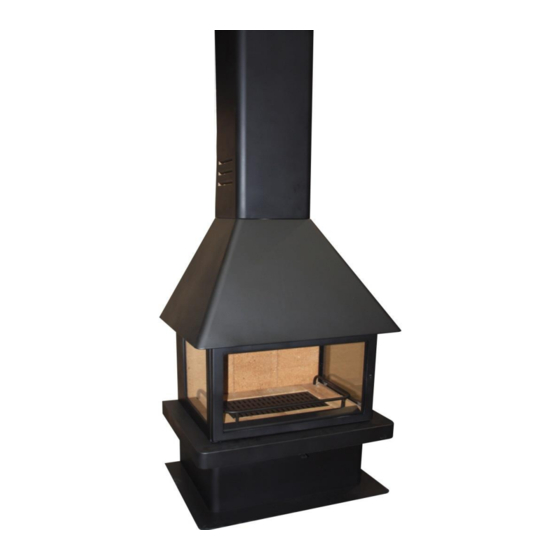
Table of Contents
Advertisement
Quick Links
Advertisement
Table of Contents

Summary of Contents for Lacunza CM-300
- Page 1 CM-300, CM-300 FD CM-300 FI, CM-300 R Instruction Book...
-
Page 2: Table Of Contents
PRESENTATION OF THE APPLIANCE Lacunza congratulates you on your choice. Certified under ISO 9001, Lacunza guarantees the quality of its appliances and undertakes to meet the needs of its customers. Confident of the know-how afforded by more than 50 years’ experience, Lacunza uses advanced technologies in the design and manufacture of its entire range of appliances. - Page 3 PRESENTATION OF THE APPLIANCE 4.1.3. Flue socket ................................16 4.1.4. Painted sheet-steel-cast-iron parts........................16 4.1.5. Firebox glass ................................16 4.2. Maintenance of the chimney flue ......................16 4.3. Important advice ............................16 TROUBLESHOOTING .......................... 17 DECLARATION OF PERFORMANCE ....................18 CE MARK ............................
-
Page 4: Presentation Of The Appliance
1.1. General characteristics Unit CM-300 CM-300 FD CM-300 FI CM-300 R Nominal Heat Output (N.H.O.) to atmosphere 10.53 10.5 Efficiency at N.H.O. - Page 5 PRESENTATION OF THE APPLIANCE Figure No.1 - Dimensions of the CM-300 appliance in mm Figure No.2 - Dimensions of the CM-300 FD appliance in mm...
- Page 6 PRESENTATION OF THE APPLIANCE Figure No.3 - Dimensions of the CM-300 FD appliance in mm Figure No.4 - Dimensions of the CM-300 R appliance in mm...
-
Page 7: Instructions For The Installer
P ≤ 10kW fixtures, etc.). 10 < P ≤ 15 Lacunza’s liability is limited to the 15 < P ≤ 20 supply of the material and does not include 20 < P ≤ 25 installation of the appliance. -
Page 8: Location Of The Appliance In The Room
INSTRUCTIONS FOR THE INSTALLER 2.2.2. Location of the appliance in the Distancia a materiales room CM 300 FI combustibles Choose a location in the room which (mm) favours good hot-air distribution by Desde el costado derecho convection and radiation. Desde el costado izquierdo Desde la trasera 2.3. -
Page 9: Height Adjustment And Levelling The Appliance
INSTRUCTIONS FOR THE INSTALLER 2.3.4. Height adjustment and levelling the Place the handle of the draught damper appliance flapper valve in a vertical position and fit the bottom of the tube cover, inserting the The appliance must be perfectly level, 4 screws that the tube cover brings, into horizontally and vertically, both at the the bell holes. -
Page 10: Connection To The Flue
INSTRUCTIONS FOR THE INSTALLER so that when overlapping those hot air heat rooms, insulating only those sections extraction holes are not closed. where excess temperature may cause damage. 2.3.6. Connection to the flue If the chimney is constructed, then it is necessary to pipe and insulate it to ensure The appliance must be connected to the correct updraught. -
Page 11: Chimney Crown
INSTRUCTIONS FOR THE INSTALLER overheating if the material is not designed to withstand high temperatures. It must be possible to clean the entire flue, no sections being left inaccessible for cleaning purposes. 2.4.2. Chimney crown The upper end of the chimney must clear the roof, the roof ridge or any obstacle located on the roof by at least 1m. - Page 12 INSTRUCTIONS FOR THE INSTALLER Figure No.11 - Distances between the chimney crown and objects within a radius of between 10 and 20m...
-
Page 13: Instructions Of Use
INSTRUCTIONS OF USE • Resinous wood may mean that the INSTRUCTIONS OF USE appliance and the flue need to be cleaned more often. The manufacturer accepts no liability whatsoever for damage caused to parts as Non-permitted fuels: a result of the improper use of non- •... -
Page 14: Description Of The Parts Of The Appliance
INSTRUCTIONS OF USE 3.2. Description of the parts of the appliance 3.2.1. Operating components Figure No.13 - Operating components on the appliance • A: Draught damper flapper valve • B: Firebox door handle • C: Primary air intake C1 open (right) C2 closed (left) •... -
Page 15: Lighting
INSTRUCTIONS OF USE 3.4. Safety 3.3. Lighting Do not store combustible materials beneath the appliance. Use of the appliance in warm weather (warm days, early hours of the afternoon on sunny days) may lead to lighting and 3.5. Loading fuel updraught problems. -
Page 16: Removing Ash
For normal use, we through which the gases pass and, recommend you close the Primary Intake consequently, control the updraught. and leave the Secondary Intakes open. The CM-300, CM-300 FD and CM-300 FI appliances have 1 deflector. 3.7. Removing ash CM-300 appliance... -
Page 17: Maintenance And Important Advice
It must be cleaned as often as required. used. How often it is cleaned depends on how Lacunza accepts no liability for any much the appliance is used and the type of modification to the product which it has fuel employed. -
Page 18: Troubleshooting
TROUBLESHOOTING TROUBLESHOOTING This symbol means that a qualified professional should be called to perform the operation. Problem Probable causes Solution Use hard woods, cut at least 2 years ago and stored in a Green or damp wood sheltered, ventilated place Use crumpled paper or firelighters and dry wood chips to light The logs are too large the fire. -
Page 19: Declaration Of Performance
DECLARATION OF PERFORMANCE DECLARATION OF PERFORMANCE... - Page 20 DECLARATION OF PERFORMANCE...
- Page 21 DECLARATION OF PERFORMANCE...
- Page 22 DECLARATION OF PERFORMANCE...
-
Page 23: Ce Mark
CE MARK CE MARK... - Page 24 CE MARK...
- Page 25 CE MARK...
- Page 28 LACUNZA KALOR GROUP S.A.L Pol. Ind. Ibarrea s/n 31800 Alsasua (Navarra) Spain Tel.: (00 34) 948 56 35 11 Fax.: (00 34) 948 56 35 05 e-mail: comercial@lacunza.net Website: www.lacunza.net EDITION: 0...





Need help?
Do you have a question about the CM-300 and is the answer not in the manual?
Questions and answers